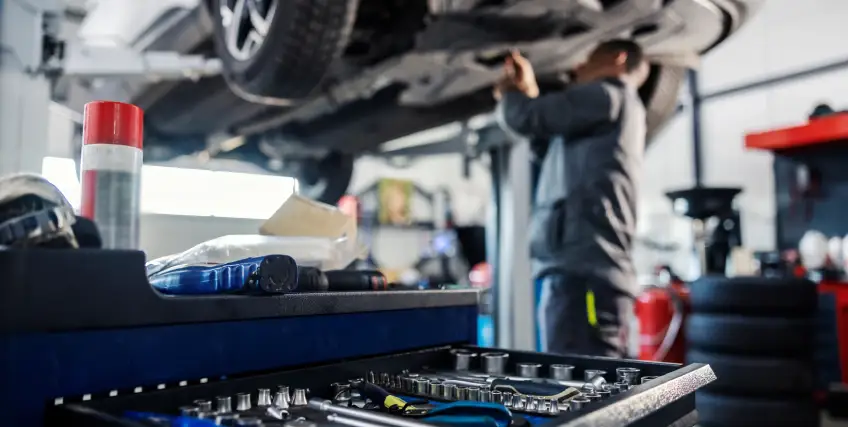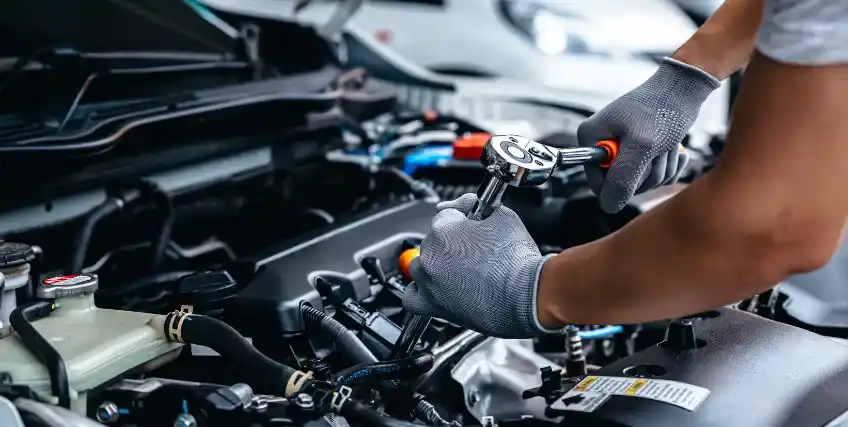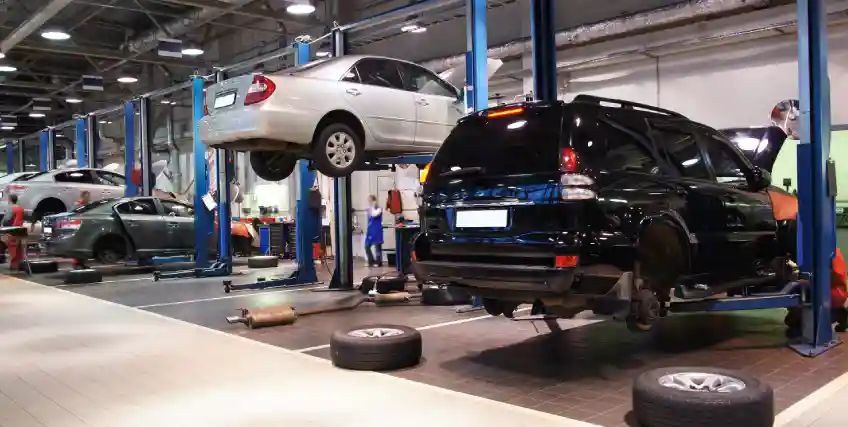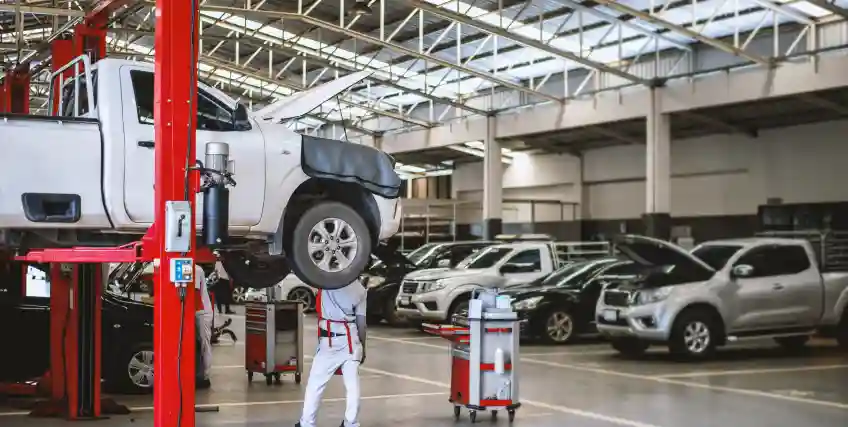How to Get a Business Loan to Start an Auto Repair Shop
Jul 17, 2025 | Last Updated on: Jul 21, 2025

Crafty mechanics may feel the urge to become business owners by starting their own auto repair shop. But while it’s one thing to be a great technical mechanic, it’s another to become an entrepreneur. The auto repair industry is competitive, and getting your business idea off the ground can be very hard work. But auto repair business loans can help you cover your startup costs and working capital needs when you’re just getting started.
Here, we walk you through the essential steps to secure auto repair business loans, from understanding your startup costs to finding the right lender.
In this article:
- How auto shop loans can help get your business off the ground.
- Types of loans that can help aspiring business owners.
- How to improve your chances of getting approved for an auto repair shop loan.
Common Auto Repair Shop Startup Costs
Underestimating startup costs is a common pitfall for new businesses. Before looking for auto repair business loans, borrowers need to have a clear idea of how much financing they need to meet their immediate business needs. Some of the common startup costs for automotive repair shops include:
- Shop improvements: Unless you’re purchasing a fully equipped shop outright (potentially using a commercial real estate loan), you may need to make significant renovations to a space. Installing vehicle lifts, creating specialized bays, building out an office space, and creating a customer waiting area may cost serious money. Moreover, you’ll need to outfit the space for drainage, lighting, and other important considerations.
- Equipment: In addition to renovating the space, you’ll likely need a wide range of specialized tools, from lifts to diagnostic tools, air compressors, hand tools, welding equipment, and much more. Equipment financing may be able to help you save money upfront.
- Inventory: You can't fix cars without parts and supplies. Your initial inventory should include commonly used parts like oil filters, air filters, spark plugs, belts, hoses, fluids, and shop supplies like rags, cleaners, and gloves.
- Licenses, permits, and insurance: In addition to a general business license, you may need specific auto repair licenses, environmental permits, and zoning permits depending on your location. Not to mention, you’ll also need comprehensive business insurance coverage. All of that can cost money.
- Working capital: When you’re first getting started, you’ll need working capital to cover daily operational expenses and give yourself a small buffer for emergencies. Many small business owners lean on working capital loans for short-term financing to prevent cash flow crises and keep the business operating smoothly.
Types of Auto Repair Business Loans
When you have a firm understanding of your financial needs, there are several funding options you can explore. Many small business loans — especially those from traditional lenders like banks and credit unions — require good or excellent credit for businesses with little history. As such, new auto repair shop owners will likely have to explore alternative options. These are some of the best auto repair business loans worth exploring:
- SBA loans: The U.S. Small Business Administration (SBA) partially guarantees SBA loans for startups and small businesses that cannot qualify for traditional funding. Microloans are a more accessible loan program for new business owners and offer loan amounts of up to $50,000 with lower interest rates and better repayment terms than many traditional options. SBA 7(a) loans may also be good options, but may have stricter eligibility requirements. You can leverage these loan programs to meet a range of startup costs and working capital needs, making them flexible auto repair business loans.
- Personal loans for business: If your personal credit score is strong and you're comfortable using your personal finances to fund your business, a personal loan can be a quick way to secure capital. These loans are often unsecured, meaning they don't require collateral, and approval times can be faster than traditional business loans. That said, you’re personally liable for the debt, which means that if the business fails, the bank could take your personal assets, like your home or car.
- Business lines of credit: With a revolving line of credit, a lender approves you for a maximum loan amount, but you only pay interest on the amounts you withdraw. Once you repay the borrowed amount, plus interest and fees, you’ll have access to the full loan amount again. Lines of credit tend to have low eligibility requirements, making them good loan options for new business owners.
- Equipment financing: New auto repair businesses need a lot of equipment. Getting an equipment loan or leasing equipment can be a good way of acquiring the equipment you need at a smaller upfront cost. With equipment loans, you’ll have predictable monthly payments, allowing you free up cash flow for other parts of your business. Equipment financing is less flexible than other auto repair business loans since the loan is tied to the equipment itself, but it’s still a good option to get the initial equipment you need.
- Working capital loans: It’s difficult for startups to qualify for significant term loans since they lack a strong credit history. However, with a detailed business plan and financial projections, you may be able to qualify for short-term working capital loans. Online lenders typically have less strict eligibility requirements and an easier application process than traditional lenders, but often have higher interest rates and less favorable loan terms. Nonetheless, working capital loans are more accessible for auto repair business loans for new businesses.
How to Improve Your Loan Application
Regardless of the type of auto repair business loan you pursue, a strong application is key to improving your approval chances. Here are some things you can do to increase your likelihood of getting approved:
- Develop a strong business plan: Your business plan is a roadmap to success and a useful tool that communicates to lenders how you plan to use the money to fuel growth. A great business plan should include market analysis, information about your management team, details about your marketing strategy, and a financial forecast that itemizes how you plan to use the money to support cash flow and break even.
- Understand eligibility requirements: Not all lenders will work with startups. Most lenders, though, are transparent about their minimum credit score, annual revenue, and time in business requirements to qualify for certain loans. Don’t waste time on auto repair business loans that you’ll never qualify for. Be realistic about your business finances and personal credit score so you can find the right loan that works for your business.
- Prepare collateral or a down payment: In some cases, lenders may require collateral to secure a business loan. In others, it may be optional, but it could help reduce your interest rate or allow you to have longer repayment terms. If you have business assets, like real estate or equipment, that you can put up as collateral, or liquid cash to use as a down payment, it could help you secure better auto repair business loan terms.
- Get organized: A well-organized, error-free loan application communicates professionalism and will save you time from having to redo an application. Make sure you have all of the documentation the lender asks for ready and take the time to review your application closely.
How to Apply for Auto Repair Business Loans
The process of applying for auto repair business loans varies between lenders, but it generally involves these steps:
- Research lenders: First, you’ll have to determine how much funding you need and the right loan for you. Then, you can research and compare lenders to find the right match for your business.
- Gather documentation: Compile all necessary personal and business financial documents, including tax returns, bank statements, personal financial statements, and your detailed business plan and financial forecasts.
- Submit application: Complete the lender’s application form, attaching all required documents. Most lenders today offer online applications.
- Lender review and due diligence: The lender will review your application, credit history, and business plan. They may request additional information or clarification.
- Approval: If approved, you'll receive a loan offer outlining the terms, interest rate, repayment schedule, and any conditions. You might have some room to negotiate before agreeing and receiving the money.
Final Thoughts
Starting an auto repair shop is challenging, but it can be a natural next step for experienced mechanics. Securing an auto mechanic loan can be tough for new business owners, but you can do it with diligent preparation and clearly understanding your options. Make sure you calculate your startup costs closely and explore all the funding avenues. When you’re ready to apply, put together a compelling business plan with thorough financial forecasts to increase your chances of getting approved for a loan.
FAQs About Auto Repair Business Loans
How much money do I need to start an auto repair shop?
The startup costs for an auto repair shop can vary widely depending on factors like location, size, and the range of services offered. Estimates typically range from $50,000 for a very small, basic shop to over $500,000 for a larger, fully equipped facility.
Can I get an auto repair business loan with bad credit?
It’s not impossible to get an auto repair business loan with bad credit, but it may be difficult. You’ll likely have fewer loan options and, if approved, will probably have a higher interest rate. It’s a good idea to explore online lenders, which tend to have less strict eligibility requirements for financing.
What are some accessible types of auto repair business loans to get?
If you’re just starting out, SBA Microloans or personal loans for business may be the most accessible options if you have good personal credit. Equipment financing is also accessible since the equipment itself acts as collateral.
How long does it take to get approved for an auto repair business loan?
Approval times vary between lenders. Online lenders may be able to approve auto repair business loans in a matter of days, while SBA loans and traditional bank loans often take several weeks or even months.
Do I need collateral for auto repair business loans?
Many auto repair business loans—especially traditional bank loans and larger SBA loans— typically require collateral. Startup business owners may also have to provide a personal guarantee, meaning they will admit personal responsibility if the business is unable to repay the funds.
Frequent searches leading to this page
Related Articles
Term Loans are made by Itria Ventures LLC or Cross River Bank, Member FDIC. This is not a deposit product. California residents: Itria Ventures LLC is licensed by the Department of Financial Protection and Innovation. Loans are made or arranged pursuant to California Financing Law License # 60DBO-35839




